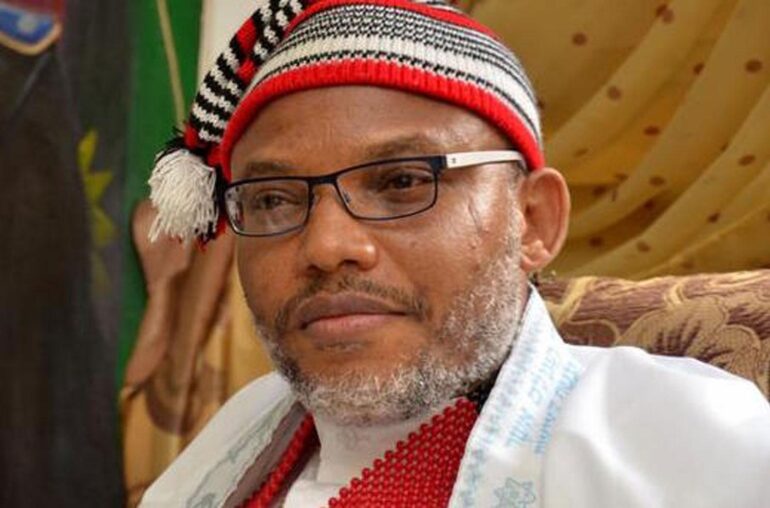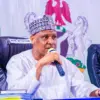The trial of Nnamdi Kanu, leader of the Indigenous People of Biafra (IPOB), on charges of terrorism and treason, resumed Tuesday before the Federal High Court in Abuja. The prosecution presented several key exhibits, including equipment linked to Radio Biafra, marking a significant development in the ongoing trial.
During the hearing, Kanu denied the allegations of violence made by the Federal Government, maintaining that his actions were driven solely by a desire to secure the freedom of the people from the South-East, South-South, and parts of Benue and Kogi states. Kanu’s defense submitted a statement he had made to the Department of State Services (DSS) on October 15, 2015, which was read aloud in court. In the statement, he reiterated his commitment to peaceful self-determination for his people.
Facing seven terrorism charges brought by the Federal Government, Kanu has been at the center of a high-profile legal battle. He was initially arrested on October 14, 2015, upon his return to Nigeria from the United Kingdom. After being granted bail in 2017 on health grounds, Kanu fled to the UK but was re-arrested in Kenya in 2021 and brought back to Nigeria, where he was detained by the DSS.
Originally facing 15 charges, eight were dropped by the trial court in April 2022 due to lack of merit. In 2022, the Court of Appeal ruled in Kanu’s favor, vacating the charges and ordering his release. However, the Federal Government appealed to the Supreme Court, which, on December 15, 2023, reversed the Court of Appeal’s ruling and directed Kanu to return to trial on the remaining seven counts.
At Tuesday’s hearing, Federal Government counsel Adegboyega Awomolo (SAN) requested that witness identities be protected for security reasons due to the sensitive nature of the case. The court ruled that while Kanu must be able to see the witnesses, they would testify behind a screen. Kanu’s defense team, led by Kanu Agabi (SAN), did not object to the request but sought reciprocal cooperation from the Federal Government regarding Kanu’s ongoing bail application.
The prosecution’s first witness, identified as Mr. A.A.A., a 18-year-old DSS operative, testified behind a screen about the events surrounding Kanu’s arrest at the Golden Tulip Hotel in Lagos on October 14, 2015. Mr. A.A.A. recounted how the DSS initially faced difficulties locating Kanu, as the hotel staff claimed he was not a guest. However, after an order from their director, the DSS conducted a room-to-room search, eventually finding Kanu in Room 303 along with a woman named Maria Ibezimakor.
During the arrest, Kanu reportedly resisted and head-butted one of the officers. DSS agents also discovered a room containing broadcasting equipment, including laptops, flash drives, microphones, mixers, and IPOB-related materials, which were presented in court as evidence in four suitcases. Kanu confirmed ownership of the equipment during questioning, and it was admitted into evidence.
The witness also testified about the recovery of Kanu’s passports, which had been missing at the time of his arrest but were later brought to the DSS office by the hotel manager. The passports, bearing the name “Okwu-Kanu Nwannekaenyi Nnamdi Ngozichukwu,” were also admitted as evidence.
In addition, the DSS played a CD of Kanu’s interrogation recorded the day after his arrest, in which Kanu confirmed his involvement in the self-determination movement and acknowledged setting up Radio Biafra. He explained that he had not registered the station with the National Broadcasting Commission because he did not anticipate being granted a license. Kanu insisted that his actions were peaceful and aligned with his fundamental right to fight for freedom, as recognized by the United Nations Charter.
The trial was adjourned to May 2 for cross-examination and the testimony of a second prosecution witness.


